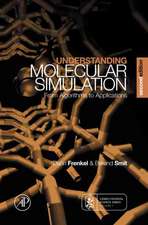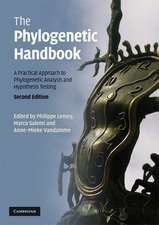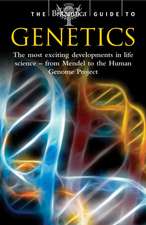Induced Pluripotent Stem Cells in Brain Diseases: Understanding the Methods, Epigenetic Basis, and Applications for Regenerative Medicine.: SpringerBriefs in Neuroscience
Autor Vivi M. Heine, Stephanie Dooves, Dwayne Holmes, Judith Wagneren Limba Engleză Paperback – 24 noi 2011
Preț: 376.22 lei
Nou
Puncte Express: 564
Preț estimativ în valută:
71.99€ • 78.44$ • 60.66£
71.99€ • 78.44$ • 60.66£
Carte tipărită la comandă
Livrare economică 23 aprilie-07 mai
Preluare comenzi: 021 569.72.76
Specificații
ISBN-13: 9789400728158
ISBN-10: 9400728158
Pagini: 75
Ilustrații: XV, 59 p. 7 illus., 6 illus. in color.
Dimensiuni: 155 x 235 x 8 mm
Greutate: 0.14 kg
Ediția:2012
Editura: SPRINGER NETHERLANDS
Colecția Springer
Seria SpringerBriefs in Neuroscience
Locul publicării:Dordrecht, Netherlands
ISBN-10: 9400728158
Pagini: 75
Ilustrații: XV, 59 p. 7 illus., 6 illus. in color.
Dimensiuni: 155 x 235 x 8 mm
Greutate: 0.14 kg
Ediția:2012
Editura: SPRINGER NETHERLANDS
Colecția Springer
Seria SpringerBriefs in Neuroscience
Locul publicării:Dordrecht, Netherlands
Public țintă
ResearchCuprins
I. Introduction.- II. Cell Reprogramming: A New Era in Regenerative Medicine.- a. Stem Cells.- b. Reprogramming Methods.- c. Measuring Pluripotency, Efficiency, and Identity.- d. Induced Pluripotent Stem Cells versus Embryonic Stem Cells.- III. Understanding Epigenetic Memory is the Key to Successful Reprogramming.- a. Pre-fertilization to Embryo.- b. Epigenetic Control in De-, Re-, and Trans-differentiation.- IV. Prospects for Cell Replacement Therapies for Brain Diseases.- a. Parkinson’s Disease.- b. Childhood Brain White Matter Disorders.- V. Conclusions.- VI. Acknowledgement.- VII. References.
Notă biografică
Dr. Vivi M. Heine is an assistant professor in the Department of Pediatrics of the VU University Medical Center in Amsterdam, Netherlands. Dr. Heine earned her doctoral degree in Neurobiology from the University of Amsterdam, Netherlands. She then received post-doctoral training at the Dana Farber Cancer Institute, Harvard University, Boston and at the Eli and Edythe Broad Center of Regenerative Medicine and Stem Cell Research, University of California at San Francisco. She obtained a tenure track position in 2010.
Textul de pe ultima copertă
The principle goal of regenerative medicine is the restoration of damaged, dysfunctional, or missing cellular tissue, up to and including whole organs. Growing healthy replacement tissue, in vivo or in vitro, plays an important role in anticipated therapies. To generate competent replacement material, scientists confront the fundamental issues of cellular identity and plasticity.
The basis of this book is formed by the theses of three talented master students: Stephanie Dooves, Dwayne Holmes and Judith Wagner. Their work discusses the recent advancements in the field of cell reprogramming. Although it is clear that we can produce pluripotent stem cells from differentiated cells, there are still a lot of unsolved issues. These issues include the efficiency and safety of reprogramming, the similarity of induced pluripotent (iPSCs) to embryonic stem cells (ESCs) and the epigenetic status of the cells. In the third chapter, the use of stem cell therapy for brain diseases will be discussed, with a focus on Parkinson’s disease (PD) and Vanishing White Matter (VWM).
The basis of this book is formed by the theses of three talented master students: Stephanie Dooves, Dwayne Holmes and Judith Wagner. Their work discusses the recent advancements in the field of cell reprogramming. Although it is clear that we can produce pluripotent stem cells from differentiated cells, there are still a lot of unsolved issues. These issues include the efficiency and safety of reprogramming, the similarity of induced pluripotent (iPSCs) to embryonic stem cells (ESCs) and the epigenetic status of the cells. In the third chapter, the use of stem cell therapy for brain diseases will be discussed, with a focus on Parkinson’s disease (PD) and Vanishing White Matter (VWM).
Caracteristici
Up-to-date review on the latest reprogramming techniques Comprehensive overview of the epigenetic models and how these will help us to map cell identity, plasticity and fate Current state and issues on induced pluripotent stem cells in cell therapies for brain diseases? Includes supplementary material: sn.pub/extras






















